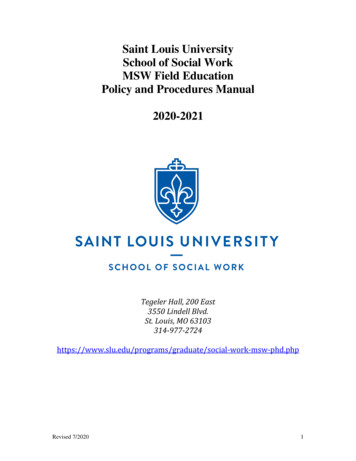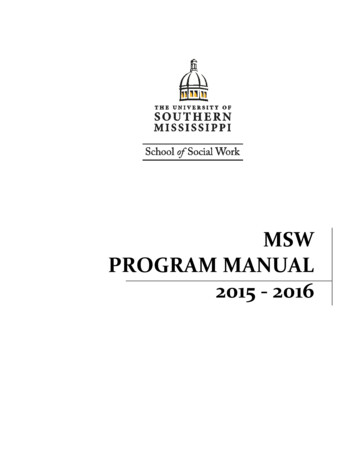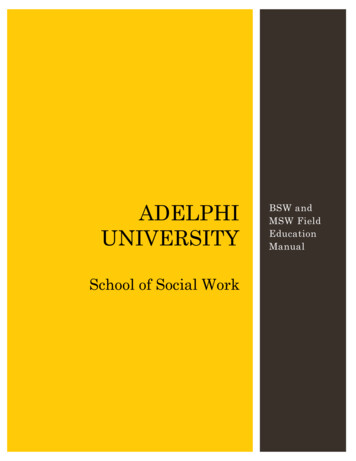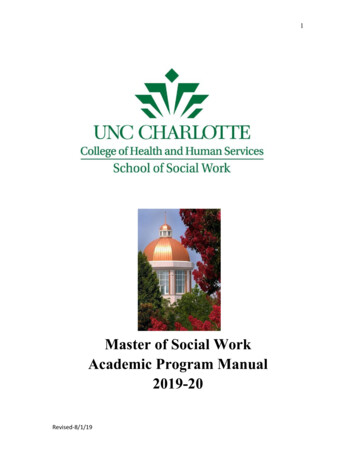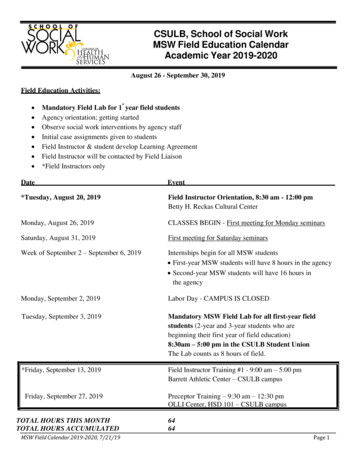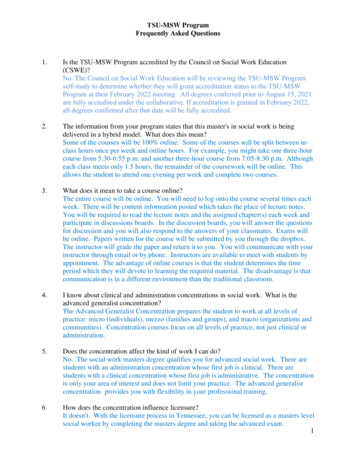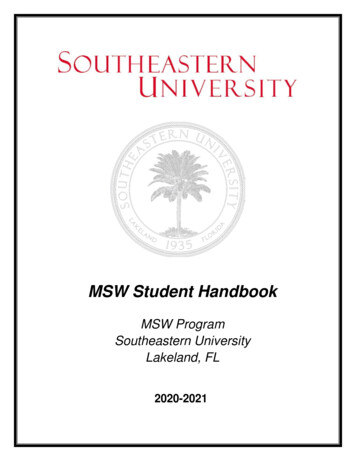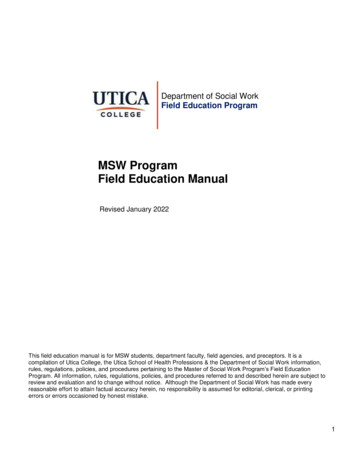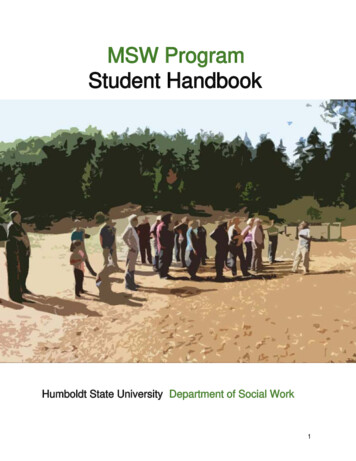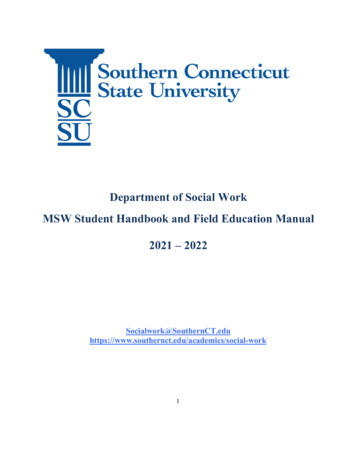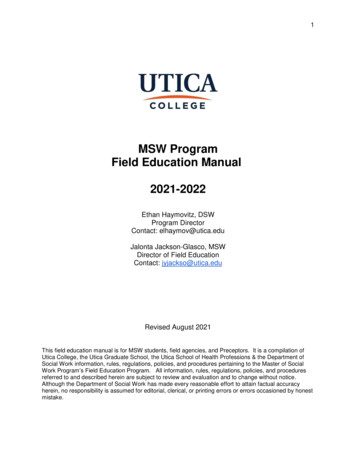
Transcription
1MSW ProgramField Education Manual2021-2022Ethan Haymovitz, DSWProgram DirectorContact: elhaymov@utica.eduJalonta Jackson-Glasco, MSWDirector of Field EducationContact: jyjackso@utica.eduRevised August 2021This field education manual is for MSW students, field agencies, and Preceptors. It is a compilation ofUtica College, the Utica Graduate School, the Utica School of Health Professions & the Department ofSocial Work information, rules, regulations, policies, and procedures pertaining to the Master of SocialWork Program’s Field Education Program. All information, rules, regulations, policies, and proceduresreferred to and described herein are subject to review and evaluation and to change without notice.Although the Department of Social Work has made every reasonable effort to attain factual accuracyherein, no responsibility is assumed for editorial, clerical, or printing errors or errors occasioned by honestmistake.
2Table of ContentsWelcome to Field Education5Field Education Advisory Committee 2021-20226About the Utica College MSW ProgramProgram Mission Statements67Planning for Field Work8Field Education Timeline and Summary7Integration Between Classroom and Field9Field Education Requirements9Field Education Policy & Standards:11CSWE 2015 Educational Policy and Standards (EPAS)11Generalist Sequence (1st Year) Competencies11Specialization (2nd Year/ Advanced Standing) Sequence Competencies15Purpose of Social Work Field Education19Overview and Objectives of Field Education19Roles & Responsibilities of all Parties Involved in Field Education20Utica College20Director of Field Education20Field Coordinator20Instructor of Field Work (Field Instructor) Seminar Courses21Field Agency22Preceptor22Student23Field Advisory CommitteePreparing for FieldCriteria for Admission into Field Education232326Process for Continuation in Field Education27Selection of PreceptorsCriteria for the Selection of Preceptors2629Preceptor Who Does Not Meet Field Education Requirements to Provide Supervision (orCannot Continue with Supervision During Active Placement)30Selection of Field AgenciesThe Criteria for the Selection of Field AgenciesProcedures for Becoming an Approved Field Education Site323233
3Evaluating Field Agency Effectiveness33Credit for Work ExperienceEmployment Based Field Education Placement3333Policies and Procedures in Field EducationPlacement of Students into Field Agencies3336Monitoring Students in Field Education Placements37Orientation to the Field39Continuing Dialogue with Field Settings and Field InstructorsSafety and Risk Management4042I. Policy42II. Procedures43III. Safety Guidelines for Students in the Field43IV. Post Incident Protocol45Best Practices to Promote a Successful PlacementHealth, Medical, and Background4447Use of Personal Automobile and Automobile Insurance47Liability Insurance47Internet Access, Computers and Electronic Devices48Professional Ethics and the NASW Ethical Principles49Dual Relationships49Supervision49Stability of Field Settings50Field TerminationRequired Field Hours and Progress in Field5051Academic, Professional and Ethical Conduct52Problem Resolution53Performance Improvement Plans53Grievance Procedures53Evaluation of Student Learning54
4
5Welcome to Field EducationWe are delighted to welcome you as you begin your practical, hands-on learningexperience to discover what we do as social workers. We want your journey to be both excitingand rewarding. The MSW Field Program at Utica College comprises of a stellar team of faculty,staff, and administrators that will accompany you on your journey.Thank you for choosing Utica College as your choice in advancing your skills andknowledge as a social worker. Our uniquely focused recovery-orientated program will focus notonly on the content in the academic environment but also on your field experience. The fieldteam will work closely with you to ensure that your field experience will allow you to bridge thetheoretical knowledge of the recovery model learned in the classroom over into practice in thecommunity with real clients.The field experience with Utica College will be one to treasure indeed. We are a uniqueprogram that will allow you to engage in field learning with required courses simultaneously. Youwill have the ability to process your field experiences with your peers and social work faculty.We acknowledge how difficult it may be for some students to commit to a rigid field schedulethat would mimic the time and commitment of a full-time job. Thus, we have designed a fieldprogram that allows students to work as little as 7 hours a week at an approved communityagency. Even with such a minimum time commitment to field learning, we still expect studentsto professionally and maturely handle the complexities and rigors of managing school, work,and practicum (also referred to as field learning and internship). Your journey is no small feat;however, you will have a team of experienced professionals in which most have taken the sameacademic and field learning path towards becoming a skilled social worker.Your success lies in your ability to commit to learning. Commit to building solidrelationships with your peers, instructors, Preceptor, field team, and a host of others at UticaCollege and at your field site. Embrace feedback and constructive criticism, as you will find thatit will aid you in becoming a better professional. Be mindful of your clients and their sensitivelives and stories. Embrace your field learning experience as a stepping stone to a brotherhoodand sisterhood of social justice warriors.This field education manual is the first descriptive and informative piece about the MSWField Learning Program at Utica College. You are expected to read it in its entirety as you areresponsible for being knowledgeable of the contents herein. While a host of other resources willbe available to aid you on your field journey, you should refer back here for questions you haveabout the field learning process and experience.We again welcome you, and we look forward to working with you as you grow andprogress in the field program.Jalonta Jackson, MSW, LSWDirector of Field EducationDepartment of Social WorkField Education Program
6Field Education Advisory Committee 2021-2022Ethan Haymovitz, MSW Program Director, Utica CollegeJalonta Jackson-Glasco, Director of Field Education, Advisory Committee ChairBethany Bahl, Field Coordinator, Utica CollegeBeckie Child, Faculty, Utica CollegeDepartment of Social WorkField Education Program
7About the Utica College MSW ProgramProgram Mission StatementsProgram Mission StatementThe mission of the MSW program at Utica College is to prepare studentsfor excellence in the practice of clinical social work using evidence-based,recovery-oriented approaches. The MSW program understands thechallenges arising from tensions between the person and theirenvironment, with cumulative traumas from developmental, social, andsystemic forces building over the life course to impede upon individuals’ability to thrive and create vulnerabilities to illness. With this in mind, inorder to build the human relationships that facilitate post-traumatic growthfor individuals, families, and groups, it is essential for clinical social workersto consider historic and institutional pressures alongside personal andinterpersonal experiences of distress, intervening through clinical practicewhile addressing the policy, economic, and institutional contexts of thework.Field Education Mission StatementThe mission of the social work field education program is to create a fusionof classroom knowledge and real-world experiential learning to producesocial work scholars and recovery model practitioners to carry on thetraditions of social work practice that improves human well-being, empowerthe vulnerable & oppressed, promote social justice & social change, allwhile being sensitive to the needs of all systems- individuals, families,groups, organizations, and communities.
8Planning for Field WorkStudents in the MSW Program at UC need to plan for a successful educational process andgraduation by becoming fully familiarized with the MSW curriculum and course sequencing.The field work courses require students to be performing tasks at an approved field agency withregular weekly supervision from an MSW who is approved by the UC MSW program. Thesetasks will be designed to assure student learning that will promote mastery of 9 competenciesspecified by CSWE. Students need to be aware when seeking admission to the MSW programthat they will need to have the requisite attributes to promote successful outcomes in the field.These include sufficient time to fulfill all required field hours, willingness to undergo all requiredbackground checks and/or fingerprinting as specified, and ability to physically, emotionally andsocially fulfill all required tasks assigned in the field education setting. Any concerns a studentmay have about what they require to be successful in the field should be discussed with theField Education Director or Program Director to determine an individualized plan to best addressany concerns identified.Field Education Timeline and SummaryMSW Field Education PlacementFirst Year Field (Generalist): Spring Semester-SWK 531,16 Weeks @ 7 hours per week 112 hours Summer Semester-SWK 532,16 Weeks @ 7 hours per week 112 hours Fall Semester-SWK 522,16 Weeks @ 14 hours per week 224 hoursTotal 448 hours*(Students are expected to have 450 hours completed by completing 2 additional hours duringone of the three semesters during the first-year field placement.)Second Year Field (Specialized/ Advanced Standing): Spring Semester-SWK 631,16 Weeks @ 7 hours per week 112 hours Summer Semester-SWK 632,16 Weeks @ 7 hours per week 112 hours Fall Semester-SWK 635,16 Weeks @ 7 hours per week 112 hours Spring Semester-SWK 636,16 Weeks @ 7 hours per week 112 hoursTotal 448 hours*(Students are expected to have 450 hours completed by completing 2 additional hours duringone of the three semesters during the first-year field placement.) Bi-Weekly supervision with Preceptor should be added to field placement hours. Bi-Weekly group supervision with the instructor of field work should be added to fieldplacement hours.
9Integration Between Classroom and FieldThroughout the generalist level, students will be taking field work seminars in which they will besynthesizing content from academic courses and learning to navigate their experiences in directand macro level practice concurrently in the field agency. Through the specialization coursesequence, beginning in the fifth semester, they will be offered the opportunity to reflect on whatworks and what doesn’t work.To integrate theory and practice, we use a model in which preceptors usher students throughthe journey of learning to make conscious and concrete their implicit values and beliefs that theydeveloped in their educational pathways and experience. This is achieved through seminars infield instruction provided by Utica College. All approved agencies and identified preceptorsmust undergo an initial training referred to as Seminar Training in Field Instruction (SIFI).Additional on-going and optional training will be offered throughout the year for agencies andidentified preceptors.While participating in field education (field internship and field education course), the studentsocial worker reflects on this through insight and self-awareness, understanding one’s owncognitive and affective reactions, comparing and contrasting the experiences of the moment tothose of the past that might be relevant. This is where practice knowledge comes from thegeneralized realm and becomes directly applicable to the professional situation in which thestudent and client find themselves. The final step is when the social worker is motivated toaction and has a professional response. The social worker designs a course of action that maybe appropriate for immediate action, or target a longer-term intervention plan that will ultimatelysuit the client’s needs and concerns.To achieve this, the Utica College Social Work Program works on a delayed model whereinstudents begin their academic coursework one semester before being placed in a fieldplacement. Once they are placed in internships, students will weekly receive 1.5 hours ofindividual or group supervision from the on-site preceptor and field course instructor, as wellas additional feedback and guidance from Utica College field personnel, including the fielddirector, field coordinator, and field faculty members. Students will be an alternating schedulefor field supervision weekly. One week students will receive individual supervision from thePreceptor, the following week the student will participate in group supervision with the fieldcourse instructor.
10A field seminar course must be completed every semester that students participate in field work,and beginning in the first semester in the field, students begin to conceptualize the ways inwhich traditional clinical social work models of practice are consistent with or divergent fromrecovery models of practice. Field seminars have both synchronous (live 1.5 hour zoomsessions) and asynchronous (discussion boards, content to review online, specific activities toengage in between live sessions).Field Education RequirementsAll field education experiences must be completed through placements at a Program-approvedfield site. Each facility has its own requirements that must be met before a student can beaccepted for a field placement. Students are responsible for meeting the assigned facility’srequirements. The Program is not responsible for securing placements for students who areunable to meet a facility’s placement requirements. The financial cost to meet manyrequirements asked by the agency the responsibility of the student; these costs are mostly notincluded in tuition and fees and are generally not covered by financial aid. Requirements mayinclude, but are not limited to Cover Letter & ResumeCriminal background checksFingerprintingProof of ImmunizationsTuberculosis ScreeningSeasonal Influenza VaccineCovid-19 VaccinePhysical Health ExaminationProof of Valid Driver’s LicenseProof of Automobile InsuranceStudents must sign the Background Check and other Field Requirements Disclosure form priorto field placement approval (Appendix I)Along with the weekly field supervision and participation in the corresponding field seminarcourse mentioned in the above section, students are required to develop a Field LearningAgreement that articulates the tasks and responsibilities in which they will engage throughoutthe generalist year internship and specialization (advanced standing) internships (see AppendixII).The Field Learning Agreement
11The Field Learning Agreement will be due within the first two weeks of the internshipstart date. Tasks must include direct practice with a caseload of clients and macro work (e.g.,speaking at city council, grant writing, policy development, community needs).A field site orientation must also commence within the two weeks of the internship start date. Arequired activities checklist will be provided to the student that will detail the minimum field siteorientation topics (see Appendix III). In addition, as outlined in the activities checklist, thestudent shall provide the Preceptor with the following items: A copy of the field seminar course syllabus. A copy of the field learning agreement form.Field Education Policy & Standards:CSWE 2015 Educational Policy and Standards (EPAS)Graduates of the UC MSW Program will have successfully demonstrated competency in the 9areas identified below by the Council on Social Work Education. These competencies aretaught during both the generalist sequence and specialist sequence at field education sites andduring accompanying field course. Mastery of each competency is displayed through a seriesof observable behaviors, which are outlined in the Learning Contract and Field Evaluationforms. More information about the Council on Social Work Education and the 2015 Educationaland Policy Accreditation Standards can be found at www.cswe.org.Generalist Sequence CompetenciesCompetency 1: Demonstrate Ethical and Professional BehaviorSocial workers understand the value base of the profession and its ethical standards, as well as relevantlaws and regulations that may impact practice at the micro, mezzo, and macro levels. Social workersunderstand frameworks of ethical decision-making and how to apply principles of critical thinking to thoseframeworks in practice, research, and policy arenas. Social workers recognize personal values and thedistinction between personal and professional values. They also understand how their personalexperiences and affective reactions influence their professional judgment and behavior. Social workersunderstand the profession’s history, its mission, and the roles and responsibilities of the profession.Social Workers also understand the role of other professions when engaged in inter-professional teams.Social workers recognize the importance of life-long learning and are committed to continually updatingtheir skills to ensure they are relevant and effective. Social workers also understand emerging forms oftechnology and the ethical use of technology in social work practice. Social workers: make ethical decisions by applying the standards of the NASW Code of Ethics, relevant laws andregulations, models for ethical decision-making, ethical conduct of research, and additional codes ofethics as appropriate to context;
12 use reflection and self-regulation to manage personal values and maintain professionalism in practicesituations; demonstrate professional demeanor in behavior; appearance; and oral, written, and electroniccommunication; use technology ethically and appropriately to facilitate practice outcomes; and use supervision and consultation to guide professional judgment and behavior.Competency 2: Engage Diversity and Difference in PracticeSocial workers understand how diversity and difference characterize and shape the human experienceand are critical to the formation of identity. The dimensions of diversity are understood as theintersectionality of multiple factors including but not limited to age, class, color, culture, disability andability, ethnicity, gender, gender identity and expression, immigration status, marital status, politicalideology, race, religion/spirituality, sex, sexual orientation, and tribal sovereign status. Social workersunderstand that, as a consequence of difference, a person’s life experiences may include oppression,poverty, marginalization, and alienation as well as privilege, power, and acclaim. Social workers alsounderstand the forms and mechanisms of oppression and discrimination and recognize the extent towhich a culture’s structures and values, including social, economic, political, and cultural exclusions, mayoppress, marginalize, alienate, or create privilege and power.Social workers: apply and communicate understanding of the importance of diversity and difference in shaping lifeexperiences in practice at the micro, mezzo, and macro levels; present themselves as learners and engage clients and constituencies as experts of their ownexperiences; and apply self-awareness and self-regulation to manage the influence of personal biases and values inworking with diverse clients and constituencies.Competency 3: Advance Human Rights and Social, Economic, and Environmental JusticeSocial workers understand that every person regardless of position in society has fundamental humanrights such as freedom, safety, privacy, an adequate standard of living, health care, and education. Socialworkers understand the global interconnections of oppression and human rights violations, and areknowledgeable about theories of human need and social justice and strategies to promote social andeconomic justice and human rights. Social workers understand strategies designed to eliminateoppressive structural barriers to ensure that social goods, rights, and responsibilities are distributedequitably and that civil, political, environmental, economic, social, and cultural human rights are protected.Social workers: apply their understanding of social, economic, and environmental justice to advocate for human rights atthe individual and system levels; and engage in practices that advance social, economic, and environmental justice.Competency 4: Engage In Practice-informed Research and Research-informed PracticeSocial workers understand quantitative and qualitative research methods and their respective roles inadvancing a science of social work and in evaluating their practice. Social workers know the principles oflogic, scientific inquiry, and culturally informed and ethical approaches to building knowledge. Socialworkers understand that evidence that informs practice derives from multi-disciplinary sources and
13multiple ways of knowing. They also understand the processes for translating research findings intoeffective practice. Social workers: use practice experience and theory to inform scientific inquiry and research; apply critical thinking to engage in analysis of quantitative and qualitative research methodsand research findings; use and translate research evidence to inform and improve practice, policy, and service delivery.Competency 5: Engage in Policy PracticeSocial workers understand that human rights and social justice, as well as social welfare and services,are mediated by policy and its implementation at the federal, state, and local levels. Social workersunderstand the history and current structures of social policies and services, the role of policy in servicedelivery, and the role of practice in policy development. Social workers understand their role in policydevelopment and implementation within their practice settings at the micro, mezzo, and macro levels andthey actively engage in policy practice to effect change within those settings. Social workers recognizeand understand the historical, social, cultural, economic, organizational, environmental, and globalinfluences that affect social policy. They are also knowledgeable about policy formulation, analysis,implementation, and evaluation. Social workers: Identify social policy at the local, state, and federal level that impacts well-being, service delivery, andaccess to social services; assess how social welfare and economic policies impact the delivery of and access to social services; apply critical thinking to analyze, formulate, and advocate for policies that advance human rights andsocial, economic, and environmental justice.Competency 6: Engage with Individuals, Families, Groups, Organizations, and CommunitiesSocial workers understand that engagement is an ongoing component of the dynamic and interactiveprocess of social work practice with, and on behalf of, diverse individuals, families, groups, organizations,and communities. Social workers value the importance of human relationships. Social workersunderstand theories of human behavior and the social environment, and critically evaluate and apply thisknowledge to facilitate engagement with clients and constituencies, including individuals, families, groups,organizations, and communities. Social workers understand strategies to engage diverse clients andconstituencies to advance practice effectiveness.Social workers understand how their personal experiences and affective reactions may impact their abilityto effectively engage with diverse clients and constituencies. Social workers value principles ofrelationship-building and inter professional collaboration to facilitate engagement with clients,constituencies, and other professionals as appropriate. Social workers: apply knowledge of human behavior and the social environment, person-in-environment, andother multidisciplinary theoretical frameworks to engage with clients and constituencies; and use empathy, reflection, and interpersonal skills to effectively engage diverse clients andconstituencies.Competency 7: Assess Individuals, Families, Groups, Organizations, and CommunitiesSocial workers understand that assessment is an ongoing component of the dynamic and interactiveprocess of social work practice with, and on behalf of, diverse individuals, families, groups, organizations,and communities. Social workers understand theories of human behavior and the social environment, andcritically evaluate and apply this knowledge in the assessment of diverse clients and constituencies,
14including individuals, families, groups, organizations, and communities. Social workers understandmethods of assessment with diverse clients and constituencies to advance practice effectiveness. Socialworkers recognize the implications of the larger practice context in the assessment process and value theimportance of interprofessional collaboration in this process. Social workers understand how theirpersonal experiences and affective reactions may affect their assessment and decision-making.Social workers: collect and organize data, and apply critical thinking to interpret information from clients andconstituencies; apply knowledge of human behavior and the social environment, person-in-environment, andother multidisciplinary theoretical frameworks in the analysis of assessment data from clients andconstituencies; develop mutually agreed-on intervention goals and objectives based on the critical assessment ofstrengths, needs, and challenges within clients and constituencies; and select appropriate intervention strategies based on the assessment, research knowledge, and valuesand preferences of clients and constituencies.Competency 8: Intervene with Individuals, Families, Groups, Organizations, and CommunitiesSocial workers understand that intervention is an ongoing component of the dynamic and interactiveprocess of social work practice with, and on behalf of, diverse individuals, families, groups, organizations,and communities. Social workers are knowledgeable about evidence-informed interventions to achievethe goals of clients and constituencies, including individuals, families, groups, organizations, andcommunities. Social workers understand theories of human behavior and the social environment, andcritically evaluate and apply this knowledge to effectively intervene with clients and constituencies. Socialworkers understand methods of identifying, analyzing and implementing evidence informed interventionsto achieve client and constituency goals. Social workers value the importance of inter professionalteamwork and communication in interventions, recognizing that beneficial outcomes mayrequire interdisciplinary, inter- professional, and inter-organizational collaboration.Social workers: critically choose and implement interventions to achieve practice goals and enhance capacities of clientsand constituencies; apply knowledge of human behavior and the social environment, person-in-environment, andother multidisciplinary theoretical frameworks in interventions with clients and constituencies; use interprofessional collaboration as appropriate to achieve beneficial practice outcomes; negotiate, mediate, and advocate with and on behalf of diverse clients and constituencies; and facilitate effective transitions and endings that advance mutually agreed-on goals.Competency 9: Evaluate Practice with Individuals, Families, Groups, Organizations, andCommunitiesSocial workers understand that evaluation is an ongoing component of the dynamic and interactiveprocess of social work practice with, and on behalf of, diverse individuals, families, groups, organizationsand communities. Social workers recognize the importance of evaluating processes and outcomes toadvance practice, policy, and service delivery effectiveness. Social workers understand theories of
15human behavior and the social environment, and critically evaluate and apply this knowledge inevaluating outcomes. Social workers understand qualitative and quantitative methods for evaluatingoutcomes and practice effectiveness.Social workers: select and use appropriate methods for evaluation of outcomes; apply knowledge of human behavior and the social environment, person-in-environment, andother multidisciplinary theoretical frameworks in the evaluation of outcomes; critically analyze, monitor, and evaluate intervention and program processes and outcomes; and apply evaluation findings to improve practice effectiveness at the micro, mezzo, and macro levels.Specialization Sequence CompetenciesCompetency 1: Demonstrate Ethical and Professional BehaviorClinical social workers take measures of self-care and seek support in developing awareness, insight,and resiliency to prevent past traumas and retraumatization from impacting their professional lives; theymonitor roles and boundaries, understanding that boundary crossing, transparency, or disclosure may behelpful when executed carefully under specific circumstances with certain clients; and they leveragesupervision and consultation to ensure continued personal and professional growth throughout theircareers. Clinical social workers should be aware of their own lived experiences of trauma and distress;their personal journeys toward resilience and mental health; they should be aware of the impact of theseexperiences on their own lives; and also aware of how these experiences may affect their work andrelationships. They understand the values of the social work profession, its ethical standards, andapplicable laws and policies, and use these professional parameters to guide decision-making. Thiswould be demonstrated in the field by way of: prioritizing service user lived experience to inform the development of services, policy,administration procedures, and research;setting and monitoring appropriate boundaries;working towar
This field education manual is for MSW students, field agencies, and Preceptors. It is a compilation of Utica College, the Utica Graduate School, the Utica School of Health Professions & the Department of Social Work information, rules, regulations, policies, and procedures pertaining to the Master of Social Work Program's Field Education .
